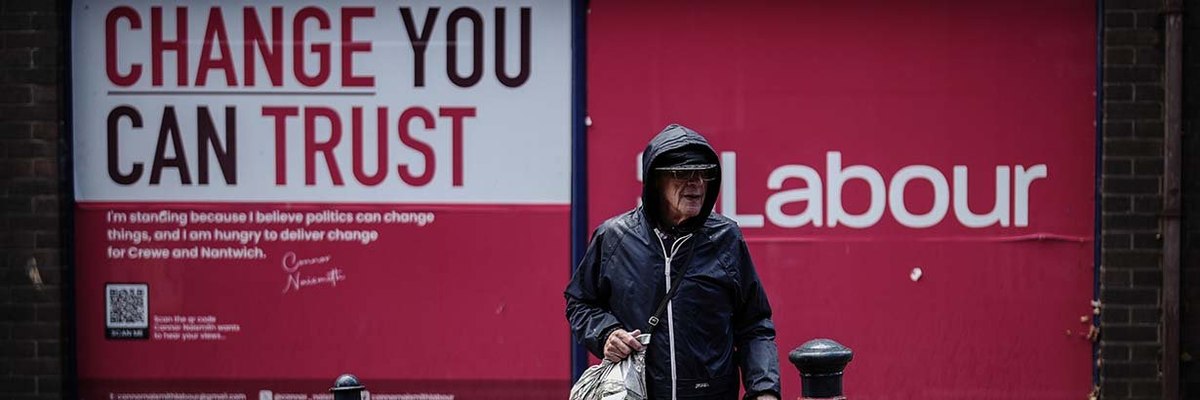A belief that Labour have broken or not delivered on their promises is the top motivation for defecting to a different party
A year ago, Labour won a landslide majority. Now, however, the party are polling in the low-20s, with significant numbers of those who backed the party last year having defected to the Lib Dems, Reform UK and the Greens, alongside some who say they ‘don’t know’ who they would vote for in a future election.
A new YouGov poll, which sampled more than 10,000 Britons, shows what is driving this seismic shift: Who are the Labour defectors? Why have they left the party? And arguably most crucially, can Labour win them back?
Who are the Labour defectors?
Compared to those 2024 Labour voters who’ve stuck with the party over the last year, Labour defectors are less likely to have been educated to degree level (41% vs 51%), more likely to be classed as living in working class households (41% vs 28%) and are more likely to have voted to leave the EU (24% vs 13%).
While just 41% of those who are still supporting Labour are women, 57% of those who’ve abandoned the party are.
But there are key differences between the different groups of Labour defectors. Those who’ve switched to the Greens are the youngest, with 70% being under the age of 50, while losses to Reform UK are noticeably older than average, with less than half (46%) having reached their half-century milestone.
While women comprise 66% of 2024 Labour voters who currently say they don’t know who to vote for, and 63% of those who now say they’d vote Green, just four in ten Labour to Reform UK switchers (41%) are women.
Labour’s losses to Reform UK are half as likely to hold a degree than those sticking with Labour (25% vs 51%), while around half (49%) voted Leave in the 2016 Brexit referendum, with a similar number (52%) classed as C2DEs, i.e. living in a working class household. Three in ten Labour to Reform UK switchers (31%) voted Conservative in the 2019 election, compared to 7% of those remaining loyal to Labour.
Labour to Lib Dem switchers look most similar to those who’ve stuck with Labour, but are more likely to be women (50% vs 41%) and much more likely to live in the South of England outside London (40% vs 24%). They are also the most likely of any group of 2024 Labour voters to have a degree (54% holding one).
Why have Labour defectors abandoned the party?
Making the choice to switch parties is no small matter, so why have these voters abandoned a party they voted into office just a year ago?
Some reasons are apparent among all groups of defectors. A belief that Labour have broken or not delivered on their promises and a feeling that the cost of living has not improved enough are given as a top reason for switching parties by at least 20% of the four largest Labour defector groups. This is particularly the case among Labour to Reform UK switchers, 44% of whom feel Labour haven’t kept to their word.
Just over a third of Labour to Green switchers (36%), alongside 28% of Labour to Reform UK and 27% of Labour to Lib Dem switchers see their new party being closer to their values as a top reason for switching.
Other reasons cited by at least double-digit proportions of all four major defector groups include a belief Labour have made no difference (14-25%), a feeling that public services like the NHS haven’t improved enough (12-22%) and their changes to disability benefits (11-20%).
But there are some reasons that tend to be more specific to certain groups of defectors. Six in ten Labour to Reform UK switchers (62%), for instance, cite immigration still being too high as one of their main reasons to change party.
By contrast, a view that Labour have been too right-wing or conservative in office is disproportionately found among Labour to Green switchers, 48% of whom give it as one of their top reasons for crossing the floor. This compares to 25% of Labour to Lib Dem switchers and 17% of 2024 Labour voters who now don’t know who to vote for.
Labour’s stances on the conflict in Gaza and on transgender rights are also particular motivators for Labour to Green converters, being respectively cited as key reasons by 25% and 19% of these switchers.
A feeling that Labour’s policies have made them worse off, as well as changes to winter fuel payments, are particularly prevalent among Labour to Reform UK switchers, with one in six (17-18%) citing either as reasons for their defection.
What do Labour defectors see as the top issues facing the country?
But while reasons for leaving Labour may vary, the NHS and the cost of living are in the top three most important issues facing the country for all four main groups of defectors, as well as for those sticking with Labour. Among those 2024 Labour voters who now back the Greens, the Lib Dems or don’t know who to vote for, 55-63% say the NHS is a top issue, while 50-56% say so of the cost living.
Labour to Reform UK switchers are less likely to say either, with the cost of living given as a top issue by 43% and the NHS by 36%. Instead, immigration is by a clear margin their top issue, with 80% identifying it as one the most important problems facing Britain.
Among 2024 Labour voters, immigration is also a larger concern for those who now don’t know who to vote for, with 30% seeing it as a top issue, compared to 20% of those sticking with Labour, 15% of Labour to Lib Dem switchers and 9% of Labour to Green switchers. Nonetheless, it is at a lower rate than among Britons as a whole, 43% of whom see it as a top issue.
The environment is the third most important issue for Labour to Green switchers, with 44% viewing it as one of the key issues facing the country. But relative to 17% of all Britons identifying it as a top issue, Labour to Lib Dem switchers (29%) and those sticking with Labour (24%) are also more likely than average to see the environment as a major issue.
Labour to Lib Dem switchers are most likely to see Brexit as an issue, with 25% saying that Britain’s relationship with the EU is one of the country’s most important issues today, while 20% of Labour to Green switchers say the conflict in Gaza is one of the biggest problems facing the UK.
Those who’ve moved to Reform UK are also noticeably more likely than other 2024 Labour voters to see crime as a top issue, with 24% doing so, relative to 11% of among all those who backed Labour. Pensions are also a particular concern, with 9% of those now backing Reform UK seeing it as a top issue, compared to 1-4% of other Labour voter groups.
How do Labour defectors feel about key politicians?
Although just 7% of Labour defectors say that a dislike of the party’s leaders is one of the top reasons they have left the party, some in Labour have pinned some of the blame for Labour’s polling woes on Keir Starmer.
Undoubtedly, those who have defected are more negative about the prime minister, giving Starmer a net favourability rating of -27, a clear gulf from the +64 among those who’ve stuck with the party. But there are differences between the defector groups, ranging from a slightly positive score of +5 among Labour to Lib Dem switchers to a very negative -73 among those who now back Reform UK.
Indeed, among Labour to Reform UK switchers, none of the politicians polled recorded a rating as poor as Starmer, including his more left-wing predecessor Jeremy Corbyn, who has a net rating of -45 among them. Nigel Farage appears to be a core draw for these voters with a rating of +73.
Labour to Green switchers have a particular fondness for Corbyn, with the former Labour leader holding a net score of +56 among this group. This contrasts with a more divisive review those sticking with Labour, who are split 48% to 46% on the now independent MP.
Alongside a net favourability score of +64 among Labour to Lib Dem switchers, Ed Davey holds a +24 score among those sticking with Labour and a +13 score with Labour to Green switchers. Additionally, he is the only politician polled with a net positive rating (+4) among 2024 Labour voters who now don’t know who to vote for.
Conservative politicians Boris Johnson and Kemi Badenoch both score poorly among all key groups of 2024 Labour voters, with the least bad net rating for either being Johnson’s -34 among Labour to Reform UK switchers.
Will Labour defectors return to the party at some point?
One of the key questions for Labour going forward is whether or not they are able to win these defectors back.
There is some hope here for Labour. Among 2024 Labour voters who currently back the Lib Dems or the Greens, six in ten (58-60%) say they are likely to consider voting for Labour at the next election. Four in ten of those who currently say they don’t know how to vote (42%) also say they are open to backing Labour again.
Losses to Reform UK, however, look more solid. At the moment, just one in eight (13%) Labour to Reform UK switchers say they are likely to consider voting Labour next time, while 37% give Labour a score of 0 out of 10 on whether or not they would be open to voting for the party, indicating the party has no chance at all of winning them back.
It also appears that losses to Reform UK could only be lost to that party rather than to the right more widely, with just one in ten (10%) saying they are likely to consider voting Conservative.
Of course, Labour cannot focus solely on bringing defectors back into the fold: it must also work to retain those it still has. The results show that a majority of 2024 Labour voters who are sticking with the party (53%) say they are likely to consider voting Lib Dem, while nearly half (45%) are equally open to voting Green, meaning there is potential for Labour’s losses to get worse.
Why are Labour voters sticking with the party?
One of the top attractions for steadfast Labour voters is a belief that the party are best placed to stop Conservative or Reform UK governments, with 42% saying it is one of the top reasons they’re still backing the party. Similarly, three in ten (31%) see other parties being worse as a key incentive for keeping them in the Labour fold.
Nearly four in ten (38%) say the fact that Labour are the party closest to their values is a top reason they have remained with Labour, while a similar number (37%) say that, while they expected more, they are still willing to give them the benefit of the doubt.
There are some who give outright positive reasons for sticking with the government. Nearly a quarter (23%) see Keir Starmer being a good prime minister as a key reason they’ve remained with Labour, while 15% say the same of being pleased with their performance in government. One in six (16%) Labour stickers say their liking for their local Labour MP or candidate is what has kept them with the party.
Have you changed your mind since the last election? What do you think about the Labour government’s first year, and everything else? Have your say, join the YouGov panel, and get paid to share your thoughts. Sign up here.
Photo: Getty








